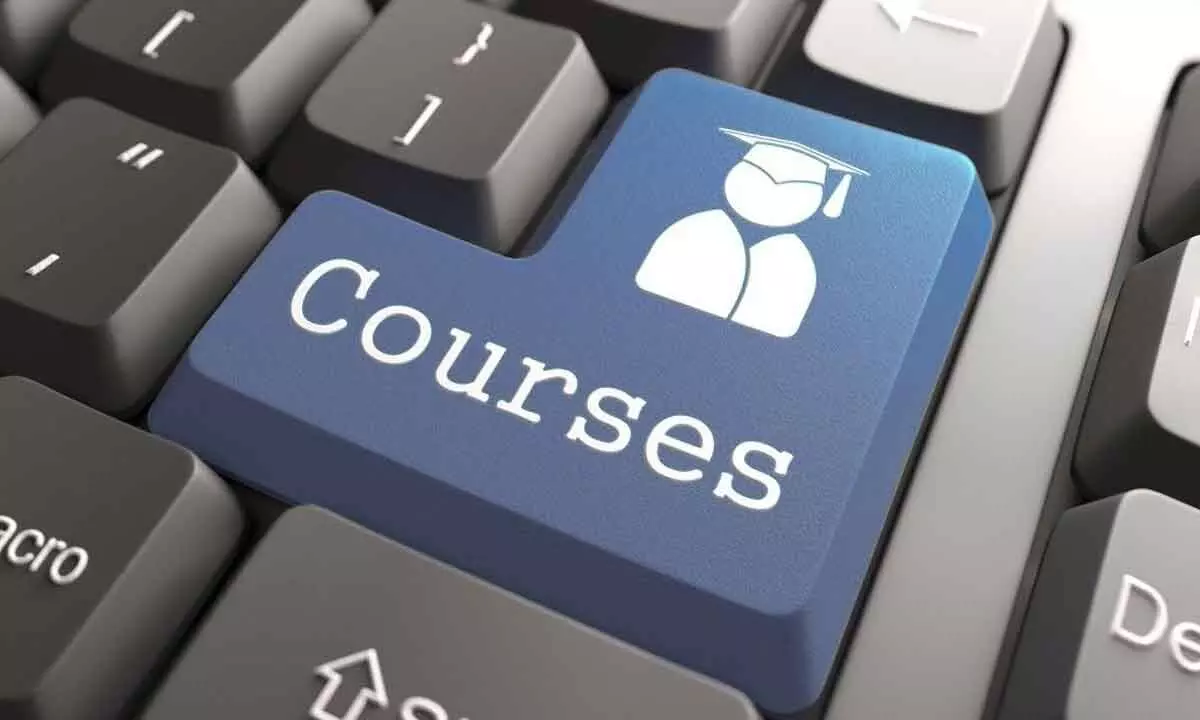Future-ready curriculum and courses

Aligning higher education with industry demands
As we thrive in an evolving digital era, the job landscape is witnessing myriad transformations. Companies across the globe are fast adopting cutting-edge technologies in their business processes, automating key functions, and leveraging digital solutions to stay ahead of the curve. This disruption brought by technology is bringing changes in existing job roles and creating new career opportunities in specific fields, necessitating efforts to prepare a workforce that is future-ready. The urgency to equip the workforce with the right, relevant and futuristic skills is also reflected in a report that revealed an overwhelming majority of 81% of organizations, participating in a survey, said they experienced a shortage of skilled tech workers. As a result of tech-based disruptions and increasing pace of digitalization and automation, it becomes a necessity for educational institutions to give emphasis to creating future-ready curriculum and courses which can bridge existing gaps and meet future demands efficiently. This can be achieved by:
Fostering digital learning environments
Unlike traditional classrooms, integrating digital learning solutions to provide an immersive, rich and, interactive learning environment has the capability to deliver better outcomes. For instance, using VR-based experiences can enable learners to immerse themselves in virtual environments that mimic real life scenarios and gain first-hand job experience, making them career-ready. Another factor that gives digital learning environments an edge is accessibility. Students can get access to a broad range of courses at their fingertips, and choose from a variety of different subjects easily. Moreover, incorporating a variety of multimedia resources, interactive tools, collaborative and practical learning activities can make learning easy, engaging, and effective.
Equipping skills of future like AI, ML, data analytics
Nowadays, organizations are actively embracing cutting-edge technologies like artificial intelligence (AI), machine learning (ML), data analytics, and others. This technology adoption is making it crucial for educational institutions to pay attention to short-term, online, or long-term courses focusing on learning know-hows of the latest technologies. For example, courses on learning how AI-based applications work can put a learner at the forefront of technological advancements, support professional development, and give a competitive edge in the job market.
Embracing personalized learning methods
To foster better learning, it is crucial to shift the focus away from the traditional one-size-fits-all or cookie-cutter approach to education. Recognizing the diverse needs and preferences of individuals, embracing personalized learning methods that focus on individual’s preferences, needs, and flexibility can deliver better results. Whether it is offering customized courses that cater to the personalized choices of individuals or providing the option of modules that enable learning at their own pace, a tailored approach not only allows students to achieve desired outcomes but further enables them to identify their weak areas, work on them, and eventually turn them into strengths to excel in career.
Promoting industry-academia partnership
Aligning the workforce with the evolving workplace needs elevate the role of industry-academia partnership. Such collaborations are essential for educational institutes to stay updated on the emerging trends, industry demands, existing skill or knowledge gaps, and prepare the students. Meanwhile, it enables the industries to constantly benefit from a talent pool of skilled professionals who carry the relevant abilities to meet their work needs and support their growth. This partnership also fosters innovation, research and development opportunities, providing better access to resources, synchronizes curriculum demands and prepares to withstand disruptions.
As the job landscape undergoes transformation brought about by technologies and digitalization, the relevance and importance of creating future-ready curriculum and courses will increase in 2024.
Making efforts to improve quality of learning by fostering a digital learning environment, equipping skills of the future, focusing on personalized learning and promoting industry-academia partnership can be the key to efficiently meet the demands of a dynamic job market in the coming future.
Multidisciplinary learning environment
A multidisciplinary learning environment transcends the traditional boundaries of single-discipline studies, encouraging students to draw on diverse perspectives and integrate knowledge from different fields. This approach is crucial in an era where solving complex global challenges often requires insights from multiple disciplines. For instance, the development of sustainable technologies may require knowledge of engineering, environmental science, and economics. By fostering an educational setting that encourages crossing disciplinary lines, students are better equipped with the versatility and adaptability needed in a dynamic job market. Moreover, this environment stimulates creativity and innovation, as students learn to synthesize varying perspectives into cohesive solutions.
Experiential learning
Experiential learning emphasizes learning through doing, which can significantly enhance the acquisition of practical skills and real-world understanding. This approach aligns with the needs of today’s digital era, where hands-on experience with technology, such as AI, ML, and data analytics, is invaluable. Incorporating experiential learning opportunities, such as internships, project-based assignments, and simulations, into the curriculum enables students to apply theoretical knowledge in practical settings, thereby bridging the gap between academia and industry. Such experiences not only make students career-ready but also foster critical thinking, problem-solving, and the ability to adapt to unforeseen challenges.
Collaborative Learning
Collaborative learning, wherein students work together to solve problems, complete projects, or achieve common goals, mirrors the collaborative nature of the modern workplace. This educational approach encourages the development of soft skills such as communication, teamwork, and leadership, which are essential in today’s interconnected world. Furthermore, collaborative learning environments leverage the collective knowledge and diverse perspectives of group members, enhancing the learning experience and fostering a sense of community and mutual respect among students. This approach also aligns with the digital learning environments that promote accessibility and interaction, further enhancing the educational experience.As the job landscape undergoes transformation brought about by technologies and digitalization, the relevance and importance of creating future-ready curriculum and courses will increase in 2024. Making efforts to improve quality of learning by fostering a digital learning environment, equipping skills of the future, focusing on personalized learning and promoting industry-academia partnership can be the key to efficiently meet the demands of a dynamic job market in the coming future. These elements foster a holistic educational experience that not only equips students with the technical skills required in the digital age but also develops the critical thinking, adaptability, and interpersonal skills needed to thrive in a rapidly evolving global landscape. By doing so, educational institutions can ensure that they are not just producing graduates who are ready for the current job market but are also prepared to lead and innovate in the face of future challenges.
(The author is CEO, Galgotias University, Uttar Pradesh)










